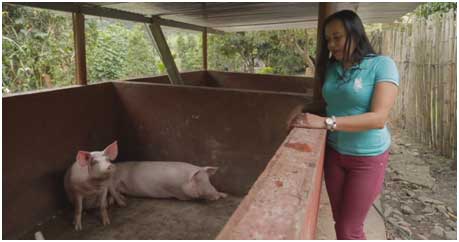Women as Forerunners of Change: When Financial Inclusion Meets Digital Transformation

MADRID, Mar 08 (IPS) - Karessa Ramos is Social Media Data Analyst for BBVA Microfinance Foundation.
Imagine a world where women fully participate in society, and enjoy equal access to resources and opportunities. Most probably, the 2030 Agenda would be nearing its fulfillment and we would be closer to achieving the better planet we wish to build.
Unfortunately, that scenario remains a vision. In Latin America, considered the most unequal region in the planet, half of the women's population still don't have a bank account.
This exclusion from the formal financial system forces them to rely on cash which is risky and unsafe and can make them easy targets for abusive loan sharks.
Moreover, financial exclusion deprives them of the chance to tap into financial resources and seize opportunities to improve their standard of living, thus making them and their children more susceptible to falling into poverty.
This is why financial inclusion is recognized within the United Nations 17 Sustainable Development Goals of the 2030 Agenda, as a tool to reduce poverty.
Technology becomes a fundamental ally to facilitate access to financial resources and bridge gender gaps. Digitalization, albeit the challenges, opens doors to design and distribute more adequate products and services that truly cater to the needs of the more vulnerable and excluded segments of the population.
Aware of this reality, at BBVA Microfinance Foundation, we work to bring the digital transformation into the microfinance sector. By leveraging innovation, we strengthen our personal relationships with the 2 million plus entrepreneurs we serve in Latin America, 57%, women. 84% of them live under vulnerable conditions, 40% possess primary education at best, 45% are single heads of households with dependants and nearly 30% live in remote, rural areas with less access to basic services such as health or communication(*).
Take the case of Sandra Mendoza, her household's breadwinner. This Colombian farmer and cattle breeder used our microcredits to adapt her livelihood to climate change and thrive in a traditionally-male sector.
She has made her immediate surroundings healthier and more environmental friendly by using organic fertilizer in her plantation and renewable energy in her home.
Also thanks to technology, she enjoys more freedom: digital innovation has made it easier for her to access her bank account through her mobile phone, without having to travel to the nearest branch office.
With more time and money in her hands, she was able to enroll in a health and well-being course. She also found time to vie for a candidacy in the local Coffee Growers' Committee, where she succeeded in becoming the first woman to preside at regional level. She even managed to create a local Association for Female Coffee Growers!
In Peru, Rut Pelaiza is a living proof on how empowering rural women through financial education can help them reach their potential and guarantee that the next generation would not suffer the same vulnerability as they had. As one of our loan officers, she is a daily witness that these women are active participants in construing sustainable development for their communities.
Rut herself used to be one of the vulnerable women she now mentors. Her husband used to belittle her, leading her to believe she was worthless. He ended up abandoning her and their children, literally leaving them with no roof over their heads.
But she possesses the desire to progress, fueled by her own strength as a woman and mother. She once dreamed of owning her own house and today, in part thanks to her work as a loan officer, she was able to do so.
Her story of triumph over life's adversities earned her a recognition from the UN Food and Agriculture Organization (FAO) last 2017. She received an Honorable Mention in the regional contest, "Stories of Rural Women in Latin America and the Caribbean".
Her case was selected among 244 testimonies from 18 countries, standing out her tenacity with which she improved her life, her family's, as well as helping so many low-income people living in difficult situations.
Whether as a loan officer who supports entrepreneurship, or as an enterprising individual, these women prove that hardships can be withstood, barriers can be toppled; they have the power to bring prosperity to their families and communities and they deserve opportunities that most of us take for granted.
Both will take part in an event hosted by the Foundation, UN Women, SEGIB, Colombia and Peru at this year's CSW63 at the United Nations. On March 13th, these forerunners of change will share their viewpoints on financial inclusion and innovation.
Committed to help achieve the 2030 Agenda, the BBVA Microfinance Foundation takes the challenge of increasing the depth and breadth of financial inclusion through technology.
We believe this venture will simultaneously reduce gender gaps and promote inclusive growth. In such a world, we don't question how financial inclusion could achieve gender equality. Rather, we ask in what way can innovation and financial inclusion be harnessed to accelerate gender equality?.
(*) Female clients who received at least one loan during 2018
© Inter Press Service (2019) — All Rights Reserved. Original source: Inter Press Service
 Global Issues
Global Issues